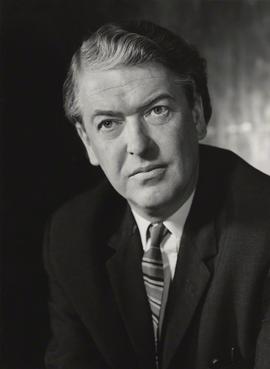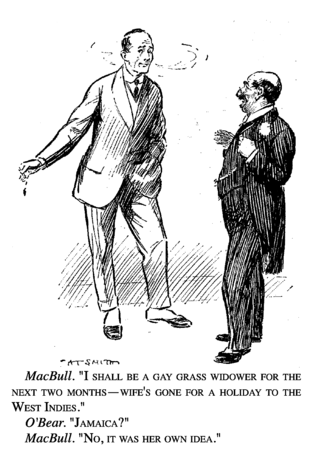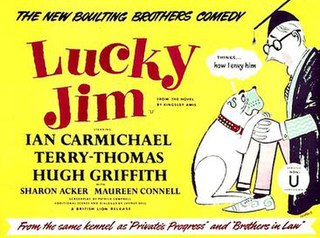Related Research Articles

Sir Kingsley William Amis was an English novelist, poet, critic and teacher. He wrote more than 20 novels, six volumes of poetry, a memoir, short stories, radio and television scripts, and works of social and literary criticism. He is best known for satirical comedies such as Lucky Jim (1954), One Fat Englishman (1963), Ending Up (1974), Jake's Thing (1978) and The Old Devils (1986).

A pun, also rarely known as paronomasia, is a form of word play that exploits multiple meanings of a term, or of similar-sounding words, for an intended humorous or rhetorical effect. These ambiguities can arise from the intentional use of homophonic, homographic, metonymic, or figurative language. A pun differs from a malapropism in that a malapropism is an incorrect variation on a correct expression, while a pun involves expressions with multiple interpretations. Puns may be regarded as in-jokes or idiomatic constructions, especially as their usage and meaning are usually specific to a particular language or its culture.
In fiction, a MacGuffin is an object, device, or event that is necessary to the plot and the motivation of the characters, but insignificant, unimportant, or irrelevant in itself. The term was originated by Angus MacPhail for film, adopted by Alfred Hitchcock, and later extended to a similar device in other fiction.

A double entendre is a figure of speech or a particular way of wording that is devised to have a double meaning, one of which is typically obvious, and the other often conveys a message that would be too socially unacceptable, or offensive to state directly.

Rowan & Martin's Laugh-In is an American sketch comedy television program which ran for 140 episodes from January 22, 1968, to March 12, 1973, on the NBC television network, hosted by comedians Dan Rowan and Dick Martin. It originally aired as a one-time special on September 9, 1967, and was such a success that it was brought back as a series, replacing The Man from U.N.C.L.E. on Mondays at 8 pm (ET). It quickly became the most popular television show in the United States.

Marilyn Pauline "Kim" Novak is an American retired film and television actress and painter. Her contributions to cinema have been honored with two Golden Globe Awards, an Honorary Golden Bear, and a star on the Hollywood Walk of Fame.
Batman: The Killing Joke is a 1988 DC Comics one-shot graphic novel featuring the characters Batman and the Joker written by Alan Moore and illustrated by Brian Bolland. The Killing Joke provides an origin story for the supervillain the Joker, loosely adapted from the 1951 story "The Man Behind the Red Hood!", which was written by Batman co-creator Bill Finger. The Joker's origin is presented via flashback, while simultaneously depicting his attempt to drive Jim Gordon insane and Batman's desperate attempt to stop him.

Brian Bolland is a British comics artist. Best known in the United Kingdom as one of the Judge Dredd artists for British comics anthology 2000 AD, he spearheaded the 'British Invasion' of the American comics industry, and in 1982 produced the artwork alongside author Mike W. Barr on Camelot 3000, which was DC Comics' first 12-issue comicbook maxiseries created for the direct market.

Beatrice Gladys Lillie, Lady Peel, known as Bea Lillie, was a Canadian-born British actress, singer and comedic performer.

Blonde stereotypes are stereotypes of blonde-haired people. Sub-types of this stereotype include the "blonde bombshell" and the "dumb blonde". Blondes have been stereotyped as less intelligent than brunettes. There are many blonde jokes made on these premises. However, research has shown that blonde women are not less intelligent than women with other hair colors.

The James Bond Dossier (1965), by Kingsley Amis, is a critical analysis of the James Bond novels. Amis dedicated the book to friend and background collaborator, the poet and historian Robert Conquest. Later, after Ian Fleming's death, Amis was commissioned as the first continuation novelist for the James Bond novel series, writing Colonel Sun (1968) under the pseudonym Robert Markham. The James Bond Dossier was the first, formal, literary study of the James Bond character. More recent studies of Fleming's secret agent and his world include The Politics of James Bond: From Fleming's Novels to the Big Screen (2001), by the historian Jeremy Black.

Michael Gary Scott is a fictional character in the NBC sitcom The Office, portrayed by Steve Carell. Michael is the regional manager of the Scranton, Pennsylvania branch of Dunder Mifflin, a paper company, for the majority of the series. Like his counterpart in the earlier British version of the show, David Brent, he is characterized as a largely incompetent, unproductive, unprofessional boss, though he is depicted as kinder and occasionally shown to be effective at his job in key moments.

Feminist Sweepstakes is the second studio album by American dance-punk band Le Tigre. It was released on October 16, 2001 by record label Mr. Lady.
An albur is a word play in Mexican Spanish that involves a double entendre.

Carol Marie Wayne was an American television and film actress. She appeared regularly on The Tonight Show Starring Johnny Carson as the Matinee Lady in the Art Fern's Tea Time Movie sketches.

"Bob's your uncle" is a phrase commonly used in the United Kingdom and Commonwealth countries that means "and there it is", or "and there you have it", or "it's done". Typically, someone says it to conclude a set of simple instructions or when a result is reached. The meaning is similar to that of the French expression "et voilà!".

"Squeeze Box" is a song by the Who from their album The Who by Numbers. Written by Pete Townshend, the lyrics are couched in sexual double entendres. Unlike many of the band's other hits, the song features country-like elements, as heard in Townshend's banjo picking.

Lucky Jim is a 1957 British comedy film directed by John Boulting and starring Ian Carmichael, Terry-Thomas and Hugh Griffith. It is an adaptation of the 1954 novel Lucky Jim by Kingsley Amis.

A dad joke is a joke, typically a pun, often presented as a one-liner or a question and answer, but less often a narrative. Generally inoffensive, dad jokes are stereotypically told with sincere humorous intent or to intentionally provoke a negative "groaning" reaction to their overly simplistic humor.

The Actress and the Bishop is a creator-owned British comic story, written and drawn by Brian Bolland. It tells the whimsical misadventures of an actress and a bishop living together in suburban England. The characters have made rare appearances in various anthologies; as of 2024 four stories of varying lengths have been produced between 1989 and 2022. The strip features only occasional dialogue; instead, most text is told in rhyming narrative captions.
References
- 1 2 Hiskey, Daven (30 December 2010). "The British Equivalent of 'That's What She Said". todayifoundout.com. Retrieved 6 January 2021.
- ↑ Bans, Lauren (3 August 2010). "That's What She Said? Yeah, Give It A Rest". GQ. Retrieved 6 January 2021.
- ↑ White, Roland (2 August 2020). "Chancellor got up the king's nose". The Times. Retrieved 6 January 2021.
- ↑ Partridge, Eric (1982). A Dictionary of Catch Phrases (2 ed.). London: Routledge. p. 31. ISBN 1134929986.
- ↑ Graham, Nicholas (10 June 2010). "Hitchcock's 'That's What She Said' Joke Is Its First Known Recording! (video)". HuffPost .
- ↑ Amis, Kingsley (1998) [1954]. Lucky Jim. London: Penguin. p. 121. ISBN 0-14-027870-2. OCLC 60220440.
- ↑ Bolland, Brian (May 2005). "The Actress and the Bishop - An Introduction". Bolland Strips!. Knockabout Comics. ISBN 9780861661503.
- ↑ Addeo, Edmond G.; Burger, Robert E. (1973). EgoSpeak: Why No One Listens to You . Chilton Books. ISBN 0801958938 . Retrieved 28 September 2012.
The cheapest shot of all, of course, is the ancient one-liner, "That's what she said." This reply can be used after virtually any remark, however innocent, and the speaker can summon up some hint of double-entendre.
- ↑ Spring, Corey (15 February 2007). "International 'That's What she Said' Day". Newsvine . Archived from the original on 17 February 2007.
- ↑ The Office US (15 July 2017), Every That's What She Said Ever - The Office US, archived from the original on 22 December 2021, retrieved 27 November 2017
- ↑ Diaz, Glenn (16 February 2010). "The Office Launches 'That's What She Said' Sweepstakes". Buddy TV. Retrieved 13 September 2022.